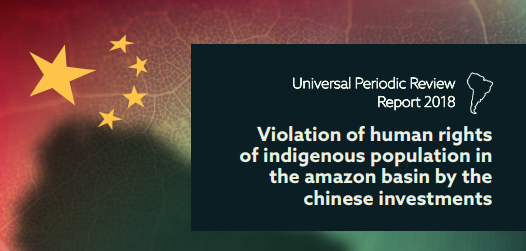- Peru, Ecuador, Kenya and Palestine reaffirmed the principle of extraterritoriality and responsibility for the respect of human rights, within the framework of its investments
Geneva, 6th of November 2018.- Today the United Nations evaluated the People’s Republic of China on compliance with human rights within the framework of the Universal Periodic Review 2018 (UPR), with the participation of delegates from 150 countries, who gave recommendations to the nation in question.
During the evaluation session, the Peruvian government, through its representative, Ana Teresa Lecaros, asked China to build regulations that guarantee the protection of human rights within the framework of the projects it implements or finances outside of its territory. «The establishment of a legal framework to guarantee that the activities carried out by the industries subject to its jurisdiction do not negatively affect human rights in their activities abroad «.
On the other hand, the Ecuadorian State, through the voice of its delegate, Alejandro Dávalos, urged China to take «measures to guarantee that development and infrastructure projects, inside and outside of its territory, maintain full consistency with human rights and respect for the environment and the sustainability of natural resources in line with international law.»
In this regard, Gregorio Mirabal, general coordinator of the Coordination of Indigenous Organizations of the Amazon Basin (COICA), an organization that has submitted a report to the United Nations with relevant information on violations of indigenous rights in investment projects with Chinese capital in 5 countries of Latin America, said «The main threat to indigenous territories in the Amazon basin is related to extractivism, oil extraction and, above all, mining. At this moment, the country with the most investments in mining and extractivism in Latin America is China. »
 [Descarga versión en español] [Download English Version] [ 普遍定 ]
[Descarga versión en español] [Download English Version] [ 普遍定 ]
During the session, the delegations of Kenya – one of the three countries in charge of the process of evaluation of China – and of Palestine reiterated the need for China to operate with adequate standards for the respect of rights in countries with the presence of environmental or social conflicts.
The Chinese delegation, for its part, dismissed concerns about its environmental policy and said that the country is accelerating the transformation of the economic development pattern and abandoning what harms the environment. «We refuse to seek shorter economic routes at the expense of the environment.»
It should be remembered that the increase of Chinese capital in Latin America is tangible and evidenced through trade, investment and finance. Only in 2016, the sovereign loans of Chinese banks in Latin America reached $21.2 billion, a figure that exceeds the amount provided by the Inter-American Development Bank and the World Bank in the same year[1].
In this regard, Vanessa Cueto, president of the DAR Civil Association and member of the Regional Coalition for Transparency and Participation, said: «We need a China with doors open to transparency regarding the environmental and social policies of its investments. The growing commercial importance of Latin America in the economic life of China should be reflected in a change of strategy towards dialogue with the Region. »
Precisely, according to the cases described in the COICA Report, there is a formula that represents a great threat to indigenous peoples: weak mechanisms of transparency regarding Chinese investment policies and standards, non-existent technical environmental information, and no participation and consultation mechanisms. This threat materializes when, despite this weakness, mining and hydrocarbon projects -such as those documented in the COICA report- are approved by the corresponding institutions of each country.
[1] MYERS, Margaret & KEVIN Gallangher. “Chinese Finance to Lac in 2016”. The Dialogue. In: China-Latin America Report. February 2017.


